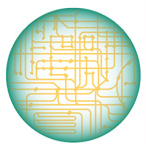The Genetics of Biofuel Trains in Panicum Grasses: Developing a Model System with Diploid Panicum hallii
2012 Awardee
Investigators: Juenger, T.; Wolfrum, E.
Institutions:University of Texas at Austin; National Renewable Energy Laboratory
Non-Technical Summary: The overall goal of the proposed research is to utilize genetic and genomic analyses to better understand the growth and development of Panicum grasses. This project will ultimately provide avenues for improving the biomass yield, stress tolerance, and tissue characteristics of C4 perennial grasses for use as bioenergy crops.
Objectives: (1) Characterize the phenotypic diversity in Panicum virgatum and Panicum hallii accessions to better understand growth architecture and developmental characteristics in natural conditions. (2) Map QTL for tillering, biomass, and tissue composition (NIR) in new mapping populations. (3) Study the patterns of gene expression and transcriptional control of tillering in Panicum grasses under harvest, nutrient, and shading conditions. (4) Develop bioinformatic resources furthering the use of diploid Panicum hallii as a models system for biofuels research.
Approach: This project will utilize detailed physiological, genetic, and genomic studies to explore drivers of plant growth, architecture, and tissue characteristics under several important agronomic conditions. This research will provide tools for predicting biomass and tissue related phenotypes from genotypes that could lead to improved and more sustainable feedstocks. The proposed work will center on a small number of agronomic switchgrass accessions as well as core accessions of a closely related diploid, Panicum hallii. P. hallii is an ideal model system as it is closely related to P. virgatum, is a C4 perennial, and has the advantages of a tractable diploid genome, a manageable stature, self-fertility, a short life-cycle, and genomic sequence resources from DOE JGI. An underlying theme of the research is to use natural variation to discover the genes important in biomass production and tissue quality under diverse environmental conditions. A key component is the further development of resources for the mapping, and ultimately cloning or manipulation, of feedstock related genes from Panicum.
Project Contact
Name: Thomas Juenger
Phone: 512-232-5751
Fax: 512-471-3878
Email: tjuenger@austin.utexas.edu
